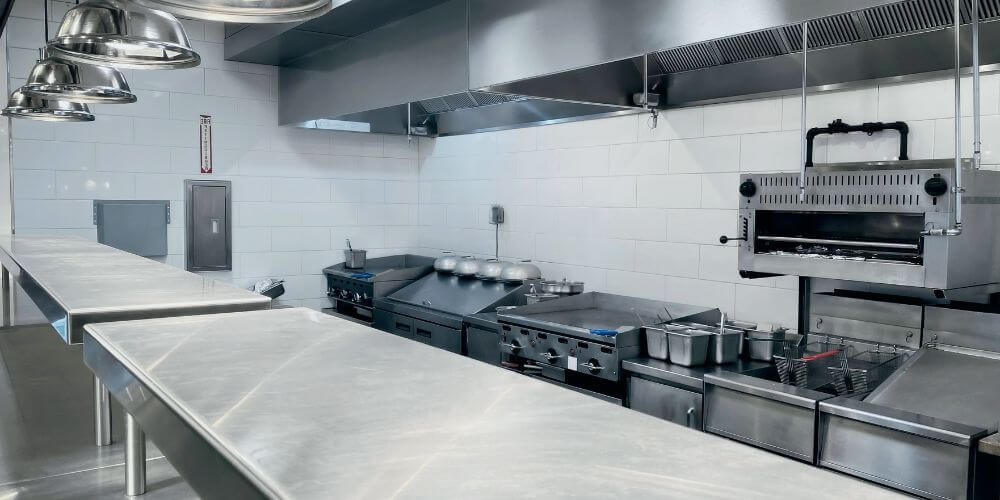In busy commercial kitchens, cleanliness is a top priority. Food safety rules are strict for a reason. Cross-contamination can lead to severe health risks, including foodborne illnesses. To prevent this, pantry owners and managers must choose suitable materials for their equipment. One material stands out for its ability to keep things shiny and uncluttered—stainless steel. It is used to make many products like stainless steel benches.
This material is a popular choice for its long-lastingness and substantial reduction of cross-contamination. This blog will explore how these classic appliances help busy kitchens maintain hygiene and why it's an essential investment.
One of the premium & long-lasting items made of the material mentioned here is a Workbench with Splashback. Check out our offerings now.
What is Cross-Contamination?
Cross-contamination happens when bacteria or harmful substances transfer from one surface or food to another. This can occur through various tools, cutting boards, countertops, or even hands. It's one of the top reasons for foodborne illness.
For instance, if raw meat touches a surface and that same surface is then used for fresh vegetables, bacteria can spread. In a fast-paced kitchen, mistakes like this are easy to make. That's where this material comes in.
Why Stainless Steel?
This substance's several properties make it ideal for preventing cross-contamination. These include its smooth surface, non-porous nature, and ease of cleaning. Let's explore these benefits.
Smooth and Non-Porous Surface
The material has a smooth, non-porous surface. Unlike materials such as wood or plastic, these offerings don't have small holes or cracks. These cracks can trap food particles, dirt, or bacteria. Over time, these trapped substances become a breeding ground for harmful germs.
The smooth surface of the substance makes it effortless to clean properly. No food particles get stuck, reducing the chance of bacteria spreading between different foods. This is especially important in workspaces where other types of food—such as meat, dairy, and vegetables—are prepared simultaneously.
Easy to Clean and Sanitise
One of the most substantial benefits of products made of this material, like stainless steel sinks, is its easy cleaning. Chefs must work quickly in a busy kitchen, but hygiene cannot be sacrificed. This offering can be wiped down easily between tasks. Unlike some other materials, it can also withstand heavy-duty cleaning products.
Sanitising is crucial in pantries, especially when handling raw food. Stainless steel can be disinfected using strong cleaners without the risk of damage. This is why commercial kitchens have standard countertops, sinks, and workbenches made of this substance. They provide an easy-to-maintain surface that reduces the risk of bacteria building up.
Resistant to Corrosion
Corrosion is another problem that can lead to contamination. When materials corrode, their surfaces break down, creating rough patches. These patches can trap food particles and become a breeding ground for bacteria.
This offering is immune to corrosion and rust, making it a great choice for areas exposed to water, heat, and chemicals. Whether it's a sink or a stovetop, stainless steel will remain intact over time, keeping surfaces smooth and easy to clean. This durability makes it a long-term investment in both hygiene and cost savings.
Temperature Resistance
Temperatures can rise quickly in commercial kitchens. Ovens, stoves, and fryers run at high heat, and bacteria multiply fast at warmer temperatures. However, the material resists heat, which helps in two ways.
Do your cutting & washing operations simultaneously with our Workbenches with Sink. Check out our entire collection.
First, it doesn't break down when exposed to high temperatures. This ensures that its smooth surface remains intact, unlike some materials that can crack or warp. Second, it cools down quickly, making it easier to clean and sanitise between cooking sessions. This quick cooling ensures that bacteria don't get a chance to multiply. For further information, visit LCE – the leading stainless steel benches supplier in Australia.
Non-Reactive with Foods
Certain materials, such as wood or plastic, can react with different types of food. These reactions can sometimes create toxic substances or change the food's composition. Stainless steel, however, is non-reactive. It doesn't interact with acids, oils, or other ingredients commonly used in cooking.
This feature prevents chemical reactions that could contaminate food. This offering remains stable and safe when handling citrus fruits, vinegar-based sauces, or meat, ensuring that the food stays clean and free from unwanted substances.
Durable and Long-Lasting
Commercial kitchens experience daily wear and tear. Equipment is constantly used, and some materials degrade over time, becoming scratched, cracked, or damaged. These degradations create spaces where viruses can develop and grow.
Stainless steel is highly durable. It doesn't crack, scratch, or degrade easily, even with heavy use. Its long lifespan ensures that your kitchen stays hygienic for years. This durability also reduces the need for frequent replacements, making it a cost-effective choice in the long run.
Versatility in Kitchen Equipment
This product is utilised for a large variety of kitchen appliances. From workbenches to sinks, shelves, and even utensils, you can find the object everywhere. This versatility allows kitchens to maintain consistent cleanliness across all areas. There are no weak spots where bacteria can hide. You can buy products made from this material from LCE – the top stainless steel sinks supplier in Australia.
For example, stainless steel gastronorm pans are famous for storing and handling food. They are easy to maintain, long-lasting and immune to contamination. The same goes for stainless steel shelves, which can store ingredients safely without the risk of rust or corrosion.
Easily Identifiable Cleanliness
Another advantage of stainless steel is its appearance. It's easy to see when the material is dirty or stained, making it much simpler for staff to spot areas that need cleaning. In a busy kitchen, where hygiene is critical, quickly identifying and addressing dirty surfaces is a significant benefit.
This visibility ensures that cleaning standards are met at all times. It also helps staff maintain high awareness about food safety practices.
Regulatory Compliance
Most health and safety regulations for commercial kitchens recommend or require equipment sourced from leading stainless steel bench dealers. Its easy-to-clean nature and durability meet the high standards set by health inspectors. Kitchens that choose stainless steel can avoid fines or penalties related to hygiene violations.
Many restaurant owners find that stainless steel helps them exceed regulatory standards, providing peace of mind that their kitchen is always ready for inspection.
Improved Workflow and Safety
Stainless steel contributes to cleanliness and helps improve kitchen workflow. Its smooth, easy-to-clean surfaces allow chefs to switch between tasks faster without worrying about cross-contamination, which can be a turning point in a busy pantry where speed and precision are crucial.
Stainless steel equipment supports food safety and productivity by minimising the time spent cleaning and maximising efficiency.
Looking for a way to wash and rinse your dishes simultaneously? Check out our Dishwasher Inlet Sink Benches to save time and effort.
Conclusion
Cross-contamination is a constant threat in the fast-paced world of commercial kitchens. Selecting the ideal product from a stainless steel sink dealer can make a significant difference in maintaining food safety. This material stands out as a top choice for reducing cross-contamination. Its non-porous surface, easy-to-clean nature, and corrosion resistance make it ideal for busy environments.
Investing in such equipment keeps kitchens clean and supports better workflow and regulatory compliance. In the long run, it's a wise choice for any kitchen aiming to uphold the highest food safety standards.






